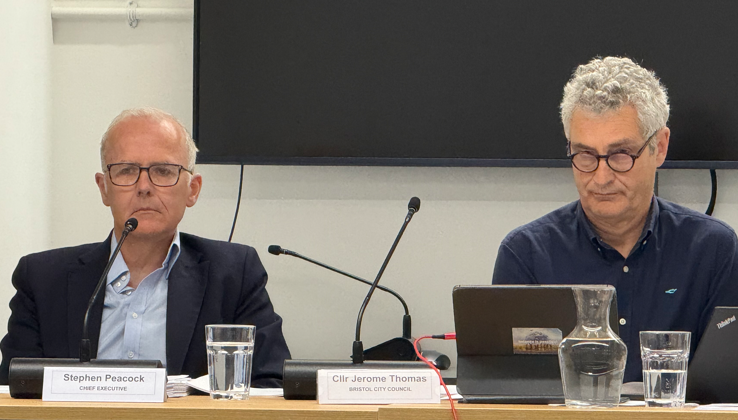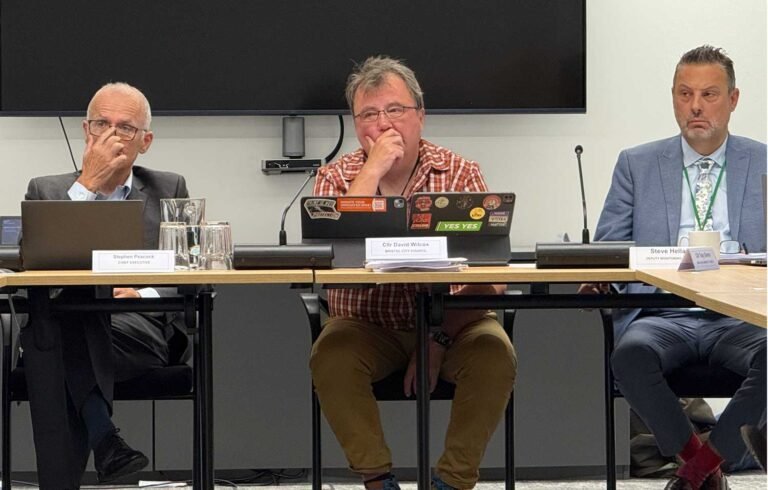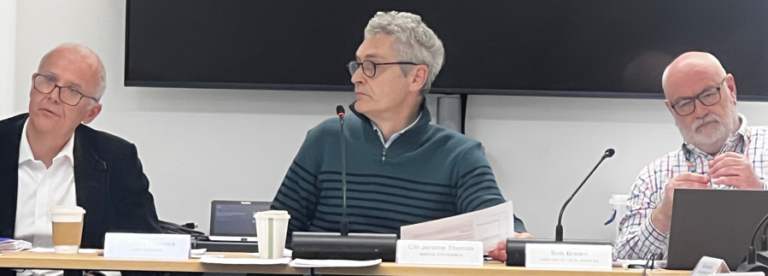A Grant Thornton report that even Weca CEO Stephen Peacock will be able to remember
The auditors are presenting their annual interim report to the audit committee of the calamitous Weca. In January Stephen Peacock suffered a moment of forgetfulness about last year’s hugely critical report – as did the monitoring officer and the scrutiny chair – no worries about that this year!
Grant Thornton has produced its interim auditor’s report. Yet the auditor seems unaware that a whistleblower’s complaint was submitted to the scrutiny chair, Jerome Thomas, in November 2024. It took Clifton and Hotwells councillor (after a prompt) three months to acknowledge. Then he did nothing. Lucky Jerome wasn’t involved in the BRI scandal. JT presumably informed the CEO Peacock and monitoring officer Brown. But they didn’t tell anyone else, breaching the law. Here’s more…
The Grant Thornton report last year was – for an auditor’s report – pretty juicy. In a controlled way. Which is why the senior officers at the West of England buried it. No need to do that this, Grant Thornton has bought the Peacock narrative. Which could be a problem for GT.
Here it is in plain vanilla. Senior officers of Weca (Stephen Peacock, chief executive, and Bob Brown, the monitoring officer), led a vendetta against former senior officers of the authority after they deemed his bus wrap unlawful.
Not only that, when a senior officer wrote a whistleblower’s complaint to the head of scrutiny, Jerome Thomas, he ignored it for months. If Thomas told the CEO and the MO they are dead in the water for ignoring it.
Not only that the Grant Thornton might as well have been dictated in places by Stephen Peacock. I am not sure that will be sustainable.
I sent in some questions (and by my own overwork/incompetence) missed the deadline. Then when I got to the heart of the matter in a statement, it was rejected.
Here are my (too late) questions and my rejected statement which I sent to councillors on audit today.
Dear Audit Committee members
I enclose a statement for Monday that has been sent to Weca and its response.
I also enclose questions that due to working commitments I was unable to submit on time.
I was not surprised about the rejection in view of the actions of senior officers in support of a vendetta by the former mayor, and their failure to deal with a whistleblowing complaint must be weighing heavily on them.
Senior officers have run an off-the-books investigation, thwarted public interest and hidden £40,000 spending in an attempt to damage the reputations of former officers.
To employ protecting the identity of these former officers as a reason for rejecting my questions would be hilarious if it were not such a grave breach of public and professional trust.
Apologies that this comes during the weekend, but Weca responded last thing on Friday and I work in London on a Sunday newspaper on a Saturday.
Best regards, Andrew Lynch

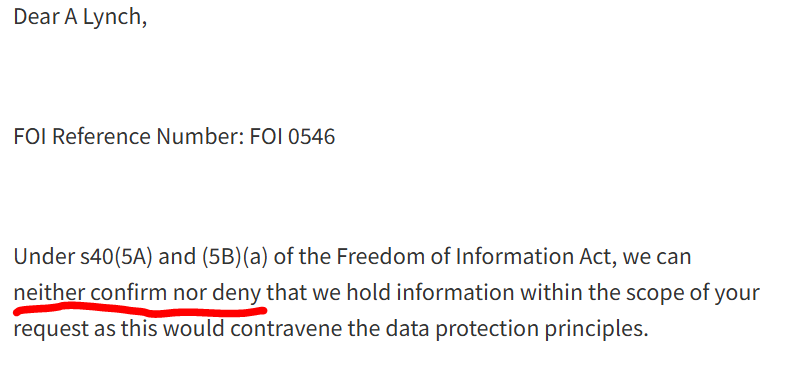
Statement to Weca audit committee
I have grave concerns about the quality and fairness of Grant Thornton’s interim annual report presented to the committee today. I am also worried that the authority appears to have kept spending and a whistleblower’s complaint from the public and the auditor.
The auditor references a report, which was conducted by former Durham fireman Stuart Errington from late 2024 to 2025 – ie, during the time of the former mayor, the current chief executive and the current monitoring officer.
This is the first public admission that the Errington report exists. In January of this year, I made a Freedom of Information request to the authority about the report. For reasons best known to itself, the authority refused to confirm or deny the existence of any such report/investigation.
The investigation’s intent was to discover whether the “regrading” of four senior officers back in 2023 broke the Weca constitution. This “regrading” occurred after requests from the officers concerned that they were doing extra work – for which some of them received an honorarium – beyond their job titles. The changes were approved subject to an independent review and received the mayor’s approval. It had little financial impact – and none in one case.
Three of those four officers regraded are still working – happily, I hope – for Weca.
By the autumn of 2024, the interim chief executive and interim monitoring officer had left. The chief financial officer and the head of HR went at the end of October.
Why would the authority want to go to all these lengths investigating former senior staff? What could it hope to prove beyond the fact that one monitoring officer made a decision that he believed to be correct and another monitoring officer later decided to relitigate it by dishing out £35,000 for Mr Errington and more than £6,000 in fees for legal advice.
Will Weca go back and mount a costly inquiry into every decision made by senior officers in its short and troubled history?
There may be reasons for all this. In July 2024 the former mayor became an MP. He had a new chief executive and a new monitoring officer. But his behaviours had not gone unnoticed. The authority had been placed in special measures. And that autumn Grant Thornton produced a report that was as excoriating as it could be. This would not have pleased the former mayor.
The other part of the puzzle was that three of the senior officers had been behind the “bus wrap” report that exposed unlawful spending by the former mayor’s team, who tried to putting huge ads of him on the sides of buses.
Did the former mayor feel it was time to exact revenge?
So Mr Errington was despatched. But he failed to interview at least one of the key players. Grant Thornton seems to have accepted a narrative in the report that had been contested by the former officers who were being investigated, when as we all know: auditors should display a “questioning mind” or professional scepticism.
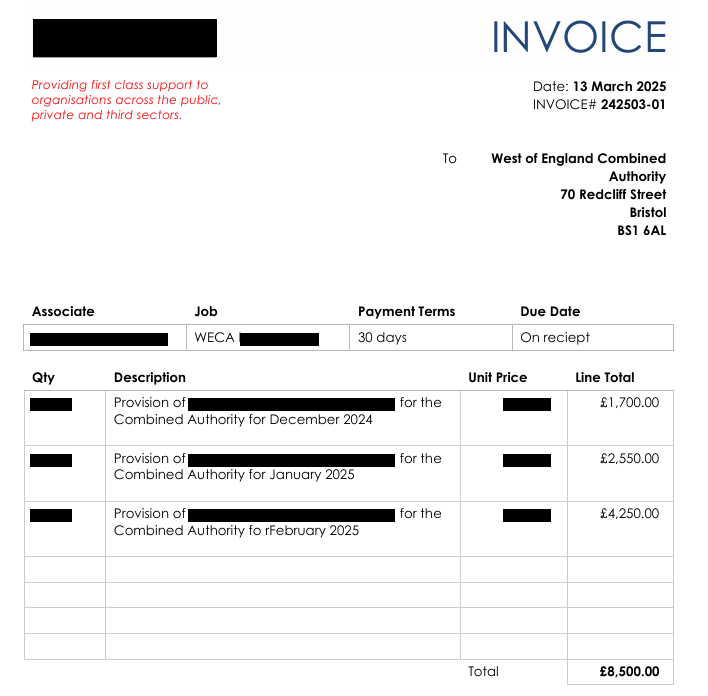
The cost of the Errington report did not appear in the quarterly financial data. In the event, I secured the invoices from Mr Errington when the authority’s accounts were open to the public this summer, and they amounted to £35,495. External legal advice was sought that appears to have amounted to more than £6,000. The fact that this spending went unpublished will no doubt concern the public, who have unknowingly been obliged to pick up the bill for this contentious report.
If the new mayor wants Weca to regain the public’s trust, we should be told which officer decided to conceal the Errington spending from the public and why.
Grant Thornton’s treatment of former officers also seems prejudiced. Former officers are referenced on page 29 in the discussion on exit payments with the phrase “we note that there appears to have been insufficient grounds for dismissal on grounds of performance”. Why would there be a mention of performance issues except to paint these former officers in a bad light?
And lastly, and perhaps most seriously, a whistleblower’s complaint has been ignored.
On November 25, 2024, a former senior officer at the West of England Combined Authority, wrote an email to Cllr Jerome Thomas, chair of the overview and scrutiny committee, with the subject line: Whistleblowing – Weca Statutory Officer Employment Investigation – Apparent Abuse of Process – Likely Retribution. After being ignored for almost three months, a follow-up email was eventually acknowledged by Cllr Thomas on February 20, 2025.
To add to the seriousness of this case, this whistleblower had been a statutory officer at the authority. The whistleblower approached the scrutiny chair rather than follow the usual process, which would have seen the complaint handled by the very subject of the complaint.
At the last meeting of the audit committee, it was stated by the head of internal audit that there had been no whistleblower complaints in 2024-25. Furthermore, the auditor appeared to be unaware of the whistleblower’s complaint, which is problematic since senior officers have a legal duty to report the existence of any whistleblowing complaints. Grant Thornton is aware of the situation now.
Grant Thornton has plenty of work to do to paint a more accurate picture of the authority in 2024-25. In the light of the critical nature of last year’s GT report, it is staggering to see that the most substantial risk to the authority’s reputation and governance – the April 4 arrest of the former mayor and his subsequent banning from this building – is reduced to: “The mayor also departed the organisation effectively in April 2025.”
And the authority has plenty of explaining to do about why it wasted so much money on a fruitless investigation, failed to publish financial spending data and ignored a whistleblower’s complaint.
Weca response
Unfortunately, your statement has not been accepted by the Deputy Monitoring Officer.
In addition to the constitutional requirement not to publish confidential information, the MCA has to meet a number of statutory and common law duties including in regard to data protection and privacy requirements. It is considered that the publication and / or broadcasting of a statement which makes reference to identifiable individuals allegedly being subject to investigation, and to an identifiable individual as being the subject of an alleged whistleblowing complaint, would not comply with the MCA’s constitutional requirements and duties in those respects.
The MCA is committed to ensuring that views across Combined Authority issues are expressed in a way that does not expose the MCA to potential action and to that end, the earlier that statements are provided the better we are in a position to ensure both that our duties and the ability to express views appropriately, are met.
Question 1
On November 25, 2024, a former senior officer at the West of England Combined Authority, wrote an email to Cllr Jerome Thomas, chair of the overview and scrutiny committee, with the subject line: Whistleblowing – WECA Statutory Officer Employment Investigation – Apparent Abuse of Process – Likely Retribution. After being ignored for almost three months, a follow-up email was eventually acknowledged by Cllr Thomas on February 20, 2025.
To add to the seriousness of this case, this whistleblower was a former statutory officer at the authority, and the complaint concerned the actions of the chief executive and the monitoring officer. The complaint was addressed to the scrutiny chair rather than through the usual process, which would have seen the complaint handled by the very subject of the complaint.
At the last meeting of the audit committee, it was stated by the head of internal audit that there had been no whistleblower complaints in 2024-25. Furthermore, the auditor appears to be unaware of the whistleblower’s complaint, which is problematic since senior officers have a legal duty to report the existence of any whistleblowing complaints.
My question is: were any, or all, of the following informed of this whistleblowing complaint: the monitoring officer; the chief executive; the S73 officer; internal audit; the external auditor, Grant Thornton; and please explain why the existence of this complaint appears to have been kept from the public and the auditor.
Question 2
In January of this year, I made a Freedom of Information request to the authority about the Errington report/investigation, which as we now know was undertaken to examine the regrading of four senior officers during the term of the former mayor. Unhelpfully, the authority refused to confirm or deny the existence of any such report/investigation.
I would add that this report/investigation into the actions of former statutory officers in approving the regrading was contentious. It failed to interview all the parties involved and remains disputed. It was also subject of a whistleblowing complaint that appears not to have been reported to internal audit or the auditor.
Every quarter, under the headline “Financial information – transparency is at the core of the Mayoral Combined Authority’s operations”, the authority publishes financial disclosures of its spending “in the interest of openness and transparency in public spending”.
However, no data about the spending on the Errington report was ever published, an omission that seems to have been deliberate.
In the event, I secured the invoices from Mr Errington when the authority’s accounts were open to the public this summer, and they amounted to £35,495. External legal advice was sought that appears to have amounted to more than £6,000. This is a large amount to keep hidden and the fact that it was concealed will no doubt cause concern to the public, who are unknowingly obliged to pick up the bill for this contentious report.
In the light of these facts, can I ask which officer decided to conceal the Errington spending from the public and why? And, most importantly, who decided that the authority would conduct a secretive investigation of a 2023 decision made by statutory officers who have left or been exited to restyle the titles and adjust the salaries (with minimal financial impact) of officers who, I believe, still happily work at the authority?
Is Weca going to launch a £40,000 probe into every disputable decision in its brief history?


